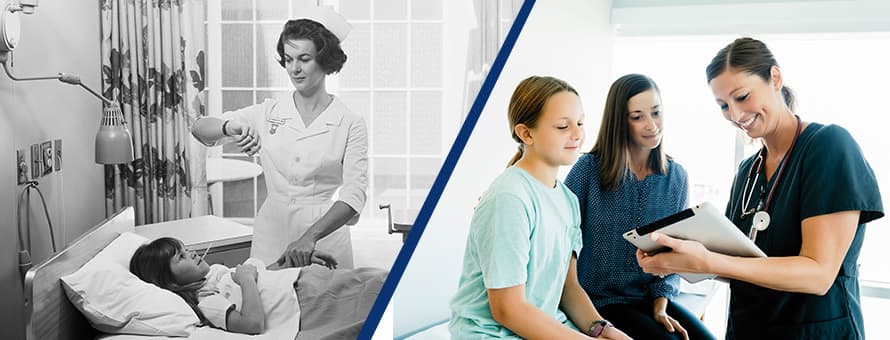10 Things You (Probably) Didn't Know About Nursing History

Understanding the numbers
When reviewing job growth and salary information, it’s important to remember that actual numbers can vary due to many different factors—like years of experience in the role, industry of employment, geographic location, worker skill and economic conditions. Cited projections are based on Bureau of Labor Statistics data, not on SNHU graduate outcomes, and do not guarantee actual salary or job growth.
National Nurses Month is celebrated each May to honor the largest segment of the country's healthcare community. In recognition of this special month, here are 10 things you (probably) didn't know about nursing history.
- In 1798, Dr. Valentine Seaman of the New York Hospital created and implemented the first system of instruction for nurses on the American continent, according to the National Women's History Museum (NWHM).
- Harriet Tubman, better known for her involvement in the Underground Railroad, also worked as a nurse for the Union Army during the Civil War, according to the NWHM.
- A nurse later renowned for her writing is Louisa May Alcott, author of the classic "Little Women." She also wrote a book called "Hospital Sketches" about nursing during the Civil War era, according to the American Association for the History of Nursing (AAHN).
- Florence Nightingale is remembered as the mother of nursing after organizing the care of sick and injured soldiers during the Crimean War. She went on to publish more than 200 books and pamphlets on nursing, including "Notes on Nursing: What It Is and What It Is Not," according to the Florence Nightingale Museum in London.
- In 1930, United Airlines hired the first female flight attendants. All eight women were registered nurses, according to the United Association of Flight Attendants (AFA).
- In 1943, the U.S. Cadet Nurse Corps became the first government program to support nursing students, according to the NWHM.
- In 1948, the National Health Service (NHS) in the U.K. brought family practitioners, hospital services and community-based services together for the first time, kicking off when nursing began to be seen as a job worthy of respect, according to Nursing Times.
- In 1954, the first National Nurses Week was observed from October 11-16. That year also marked the 100th anniversary of Nightingale's mission to Crimea, according to the American Nurses Association (ANA). National Nurses Week is now celebrated annually from May 6-12.
- In 1970, only 3.9% of the nursing field was made up of men, according to the U.S. Census Bureau (PDF Source). This number has increased in recent years as the U.S. Bureau of Labor Statistics (BLS) reports that men made up 13.3% of the nursing field in 2021 – more than a 9% growth. A few Southern New Hampshire University (SNHU) alumni weighed in on what it's like to be a man in nursing.
- In 2008, 13% of nurses had obtained a master's or doctoral degree, according to the American Association of Colleges of Nursing (AACN). A decade later, this percentage had increased by 6% with 19% of registered nurses in the U.S. having earned an advanced degree, such as a master's in nursing, or a doctoral degree, according to the AACN.
You could also become a nurse or advance in the profession and be a part of history. A degree can change your life. Find the SNHU nursing program that can best help you meet your goals.
Joe Cote is a staff writer at Southern New Hampshire University. Follow him on Twitter @JoeCo2323.
Explore more content like this article

SNHU Joins Sigma, Global Nursing Honor Society

Academic Spotlight: Dr. Ashley Love, Program Director of Public Health Programs

What is Population Health Management?
About Southern New Hampshire University

SNHU is a nonprofit, accredited university with a mission to make high-quality education more accessible and affordable for everyone.
Founded in 1932, and online since 1995, we’ve helped countless students reach their goals with flexible, career-focused programs. Our 300-acre campus in Manchester, NH is home to over 3,000 students, and we serve over 135,000 students online. Visit our about SNHU page to learn more about our mission, accreditations, leadership team, national recognitions and awards.


